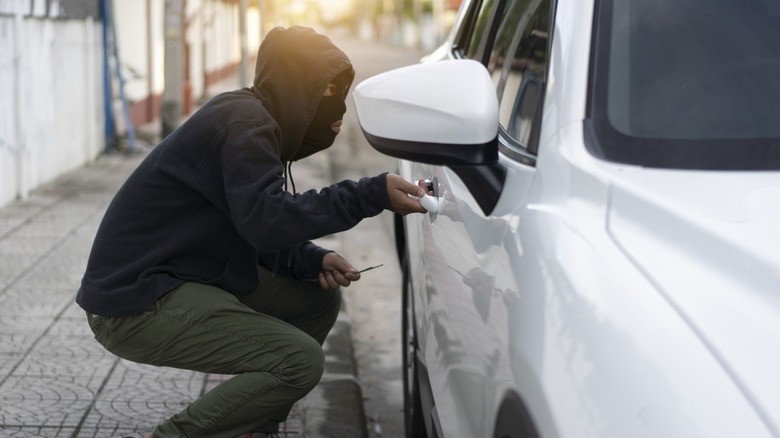Why Theft Recovery Cars Are So Cheap (And Can They Be Insured?)
Have you ever browsed used car listings and spotted a not-so-old car priced several thousands below similar models? If it comes with a label that says it's a theft recovery car, that might explain the discount, but it doesn't answer a lot of questions, does it? Will you be getting a really good deal, or are you about to buy someone else's problem?
Generally, you have to be very careful when buying used cars. However, the history of theft recovery vehicles makes things even more complicated. For context, they are generally cars that were stolen, later found, and now they're back on the market, usually at a fraction of the cost of other used cars. While the price might seem like a bargain, these cars come with their fair share of risks. Even if the vehicle looks and runs just fine, issues like missing parts, title complications, or trouble getting it insured can make owning one rather difficult. And that's the part many buyers don't find out until it's too late.
Let's look at why theft recovery cars tend to be cheaper, what hidden problems they might come with, and, most importantly, what to expect when you try to get one insured. If you're considering this kind of deal, here's everything you need to know before saying yes.
What are theft recovery cars?
Theft recovery cars are vehicles that were stolen from their original owners and later recovered by the police. But once a car is stolen and an insurance claim gets paid out, it doesn't always go back to that original owner. Instead, the insurance company takes possession of the vehicle and often sends it to auction. At these auctions, these cars get sold for less than the usual market value.
While that low price tag can be tempting, the bigger issue with theft recovery cars is what kind of title they carry. Many of them take on a branded title, most commonly a salvage title, which affects the car's status. Under normal circumstances, a salvage title means the car was physically wrecked. In the case of theft recovery, it just means the car wasn't found in time, and the insurance company has gone ahead and labeled it a total loss.
Most insurance companies have a set window, usually around 21 to 30 days. If the stolen vehicle isn't recovered by then, the insurer pays out the claim and writes off the car. Even if the car is found in perfect condition a few days after that, it's already too late. That title stays with the vehicle for life.
If the car is found quickly, within that 21-to-30 day window, and in good shape, it may keep its clean title. A clean title means the car retains its original value and avoids the depreciation that comes with a salvage label. But that's not always guaranteed. Some states, like Arizona, Florida, Georgia, Illinois, and Maryland, automatically assign a branded title to any stolen-and-recovered car, no matter the condition. In those states, the fact that the car was stolen is enough to impact its title forever.
Why are theft recovery cars so cheap?
When theft recovery cars receive their branded title, their value noticeably reduces, and there are several reasons for this. One major factor is the potential for damage that occurs during the theft or recovery process. When a car is stolen, it might be driven recklessly, crashed, or stripped of some parts. Even if the damage isn't immediately obvious, buyers have to worry about hidden issues like electrical problems or mechanical faults that could pop up later. This uncertainty drives down the price, as people aren't willing to pay full value for a car that might need unexpected repairs.
Another reason these cars are affordable is the stigma tied to their history. Many buyers hesitate when they see a car was stolen, imagining it might have been involved in a crime or simply feeling uneasy about its past. Title issues also play a big role in keeping costs down. Like we said earlier, many theft recovery cars end up with branded titles, especially if they're recovered after an insurance company has written them off as a total loss. A theft recovery label is automatically applied, regardless of condition, further dropping the value by 20% to 40%.
Finally, the combination of these factors; potential damage, buyer stigma, and title complications, creates a market where theft recovery cars simply don't fetch the same price as clean-title vehicles. While this can mean significant savings for buyers, it comes with trade-offs. The car might need repairs to be roadworthy, and those costs can add up. Plus, financing is often tough to secure as many lenders shy away from the risk, leaving buyers to pay upfront.
Can theft recovery cars be insured?
Whether a theft recovery car can be insured depends heavily on the car's title status. Many theft recovery cars carry a salvage title, and a car with a salvage title can't be insured or driven legally on public roads because it's not considered roadworthy. This means if your theft recovery car still has a salvage title, insurance isn't an option until it's been properly fixed and reclassified.
If a salvage theft recovery car is repaired and passes a state inspection, it can earn a rebuilt title, making it roadworthy and eligible for insurance. However, insuring a car with a rebuilt title comes with its own set of challenges. You'll need to prove the car is in good condition, often by providing documents like a certified mechanic's statement confirming it's safe. Even with these, insurance options are limited; most companies will only offer liability coverage, which protects you financially if you cause damage to someone else's property or vehicle in an accident. This basic coverage lets you drive legally, but it won't help if your car gets damaged.
Getting more extensive coverage, like comprehensive or collision insurance, is much harder for a rebuilt theft recovery car. Comprehensive coverage pays for non-collision damage like theft, fire, or hail, while collision coverage handles repairs if you hit another car or object.
Many insurers hesitate to offer these because rebuilt cars carry risks from their past that might not have been fully repaired. There's also the concern that if the car breaks down or gets into another accident, it could be tough to tell if the damage is new or tied to its history. When companies do provide this coverage, expect higher premiums along with limitations.



